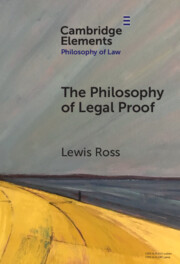Element contents
The Philosophy of Legal Proof
Published online by Cambridge University Press: 23 April 2024
Summary
- Type
- Element
- Information
- Series: Elements in Philosophy of LawOnline ISBN: 9781009127745Publisher: Cambridge University PressPrint publication: 16 May 2024
References
- 5
- Cited by

